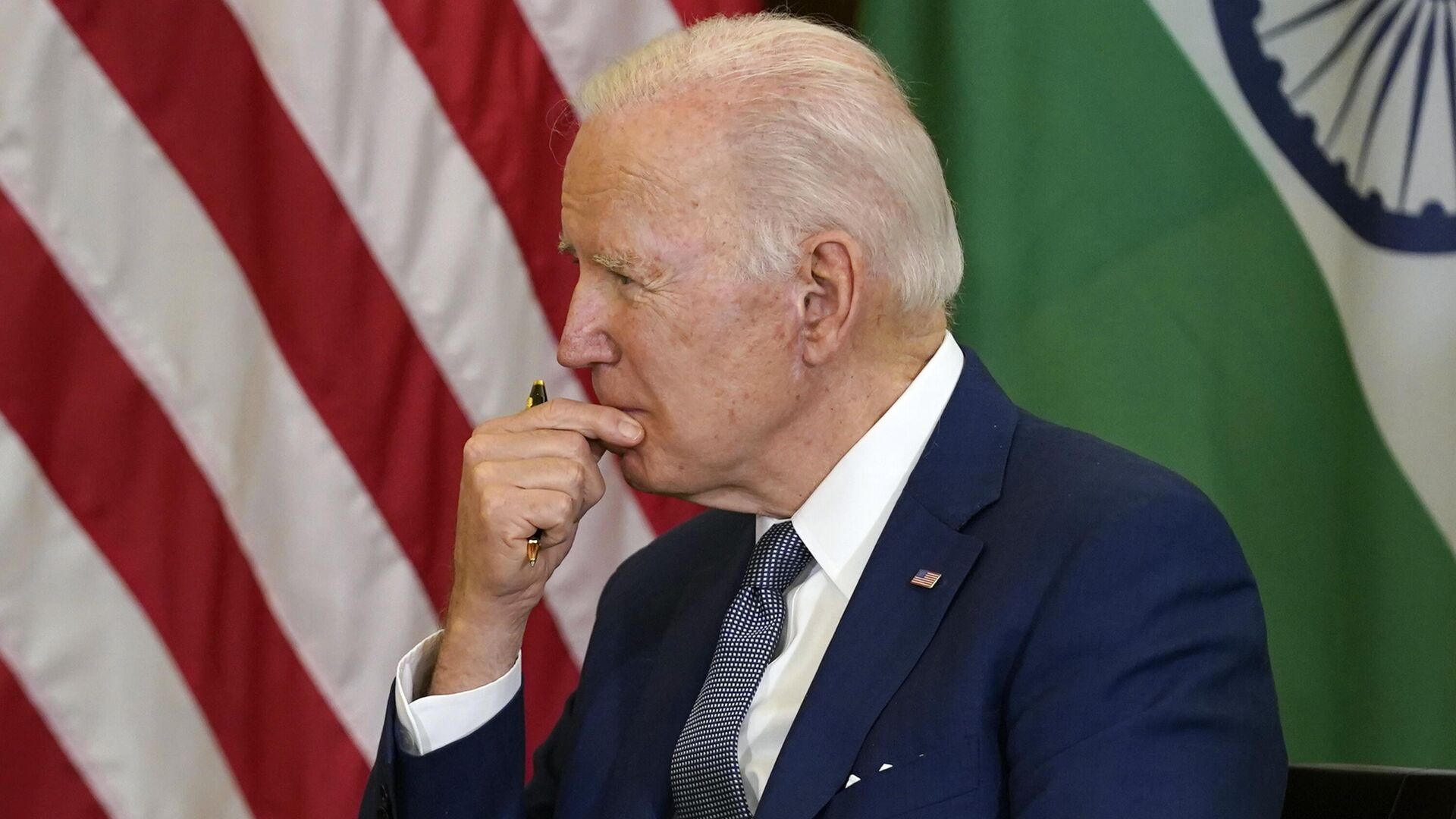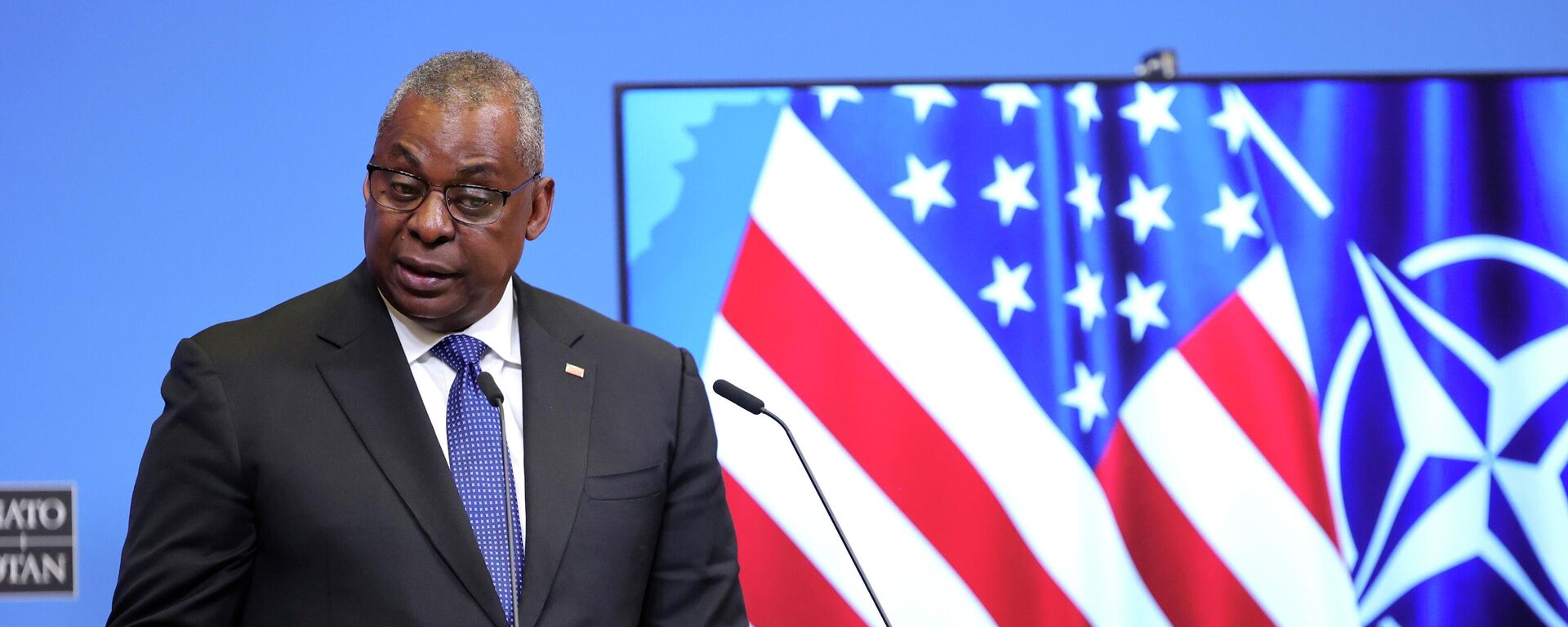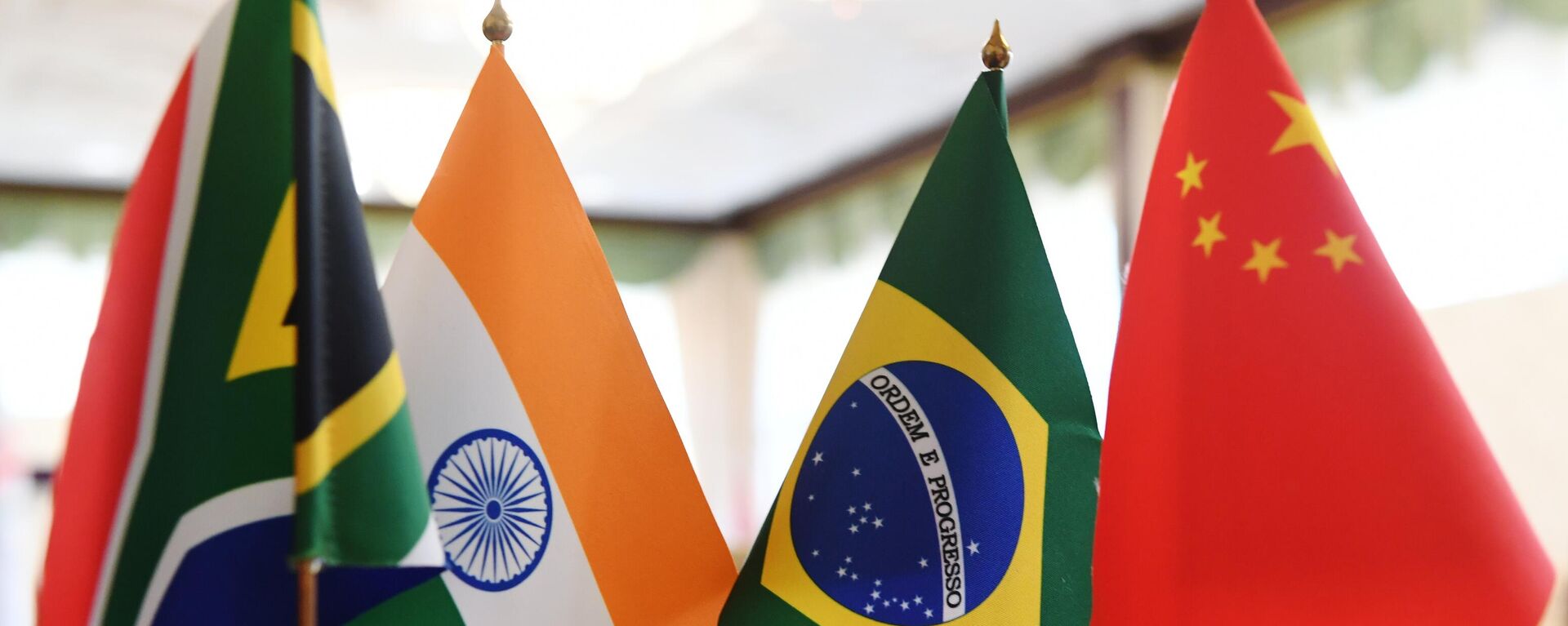https://sputniknews.in/20230601/sl-kanthan-us-not-interested-in-indias-strategic-autnonomy-2278320.html
S.L. Kanthan: US Not Interested in India’s Strategic Autonomy
S.L. Kanthan: US Not Interested in India’s Strategic Autonomy
Sputnik India
US Defense Secretary Austin’s trip aims to boost “operational cooperation” and a defense partnership between US and India. The overall aim is, of course, to pull India into American sphere of influence as much as possible.
2023-06-01T17:38+0530
2023-06-01T17:38+0530
2023-06-01T19:00+0530
sputnik opinion
india
us
strategic autonomy
strategic partnership
indo-pacific
multipolar world
global south
dedollarisation
ukraine
https://cdn1.img.sputniknews.in/img/07e6/0c/0c/38613_0:157:3000:1845_1920x0_80_0_0_c17d7797e0059be851cd581948e99512.jpg
During his upcoming trip, US Defense Secretary Lloyd Austin is expected to up pressure on India over its diplomatic stance on the Ukraine conflict and Delhi's ties with Russia, which have become known as part of India's strategic autonomy.Sputnik reached out to SL Kanthan, an Indian geopolitical analyst and writer, to hear his opinion on Indo-American ties, US attempts to embroil India in tensions of its own making and India's foreign policy guided by strategic autonomy — a concept that is increasingly gaining traction.US' Unwavering Alliance vs. India's Strategic AutonomySputnik: Ahead of Lloyd Austin's visit to India this week, how would you assess the current state of Indo-American relations? To what extent do the interests of both countries truly align?SL Kanthan: The India-US relationship is very complex and conflicted since India’s interests are best served by strategic autonomy, while the US would prefer an unwavering alliance.US Defense Secretary Austin’s trip aims to boost “operational cooperation” and a defense partnership between the two countries, with deals such as manufacturing GE’s [General Electric] engines for fighter jets in India. In the big picture, the US has one primordial interest: extend the primacy of the American Century. That entails disrupting Eurasia, which means preventing the rise of Asia, containing China, and weakening Russia. Overall, those goals don’t align with India’s interests, even if India might be wary of China’s rise.The emergence of a multipolar world is inevitable. Thus, India needs to look ahead and critically assess what the world would look like a decade from now and beyond.India’s core interests and focus over the next couple of decades should be infrastructure, trade, development, and peace.Sputnik: The United States has made no secret of the fact that it wants India to become a central part of its anti-China coalition. Do you think that such an alignment is in India’s best interests? SL Kanthan: India and China have some structural geopolitical conflicts of interest in terms of their border, Pakistan, and spheres of influence. However, these problems are not insurmountable.China is the #1 or #2 trade partner for India. Over the next decade, India can leverage China more for a win-win partnership through FDI and offshoring of manufacturing. Consider how China benefited enormously by inviting Japanese and Korean companies in the 1990s and 2000s. That should be India’s model for working with China for the next two decades.Instead, India and China should create security architecture to peacefully resolve their border issues, and then move forward on numerous areas of constructive cooperation. At that point, India can join the Belt and Road Initiative and harness China’s infrastructure expertise.The 21st century can belong to Asia, but not if India and China succumb to the old divide-and-rule stratagem of the imperialists.Sputnik: The US has also been lobbying India to "condemn" Russia’s special military operation in Ukraine and distance itself economically from Moscow. What do you think India’s policy towards Russia should be?SL Kanthan: Everyone with a basic understanding of history and geopolitics can see what’s happening in Ukraine. Even as early as 1992, Western elites had laid out plans for NATO expansion, including specific dates to bring Ukraine into the fold. In the late 1990s, Brzezinski wrote explicitly in his book “The Grand Chessboard” that bringing Ukraine into NATO would cripple Russia.India’s foreign policy establishment hopefully understands how the US has staged color revolutions (2004) and coups (2014) in Ukraine to turn the latter into a veritable security threat for Russia. Furthermore, how neo-Nazism and ultra-nationalism have become mainstream in Ukraine should be alarming to everyone.India benefits from a vibrant and independent Russia, which has been a true Indian ally for a long time. Russia’s natural resources will play a critical role in India’s rapid growth over the next two decades. Also, from a pragmatic geopolitical point of view, alienating Russia will only create a strong Russia-China partnership, which won’t be in India’s best interests.Sputnik: How does India benefit from de-dollarization? What do you think is the most promising alternative to the dollar?SL Kanthan: I have listed ten advantages of de-dollarization in my Substack article. This is an imperative for all developing nations in order to gain sovereignty and prosperity. The dollar hegemony is a relic of Western colonialism and imperialism.There are two ways to de-dollarize. First, trading in local currencies using a currency-swap system. However, this is a limited option when two countries have enormous trade imbalances.Thus, the second option is to create a bloc currency. For example, a BRICS currency, which will be used exclusively for trade among members – and thus won’t replace sovereign currencies. To ensure trust and value, such a currency should be backed by commodities such as gold, oil, natural gas, wheat, rare earth minerals etc. Such a currency will have real value – unlike the fiat dollar – and will also be democratic.Sputnik: India's opposition leader Rahul Gandhi has embarked on a large tour across America. What do you think Gandhi is trying to achieve with this visit? Does it say anything about his foreign policy priorities or preferences?SL Kanthan: This is a standard American modus operandi to influence politics and elections in other countries. We saw that with the recent elections in Turkiye as well.My advice to politicians of any developing country: If you’re going to travel abroad, don’t limit yourself to the United States of America. Go to numerous other countries in the Global South.SL Kanthan is a geopolitical analyst and writer based out of Bangalore, India. Follow him on Twitter: @Kanthan2030 and Substack: slkanthan.substack.com
https://sputniknews.in/20230531/us-wants-to-co-opt-india-in-military-confrontation-with-china-ex-envoy-2263501.html
https://sputniknews.in/20230531/what-is-brics-and-why-everyone-wants-to-join-the-grouping-2247768.html
india
us
indo-pacific
global south
ukraine
Sputnik India
feedback.hindi@sputniknews.com
+74956456601
MIA „Rossiya Segodnya“
2023
Sputnik India
feedback.hindi@sputniknews.com
+74956456601
MIA „Rossiya Segodnya“
News
en_IN
Sputnik India
feedback.hindi@sputniknews.com
+74956456601
MIA „Rossiya Segodnya“
Sputnik India
feedback.hindi@sputniknews.com
+74956456601
MIA „Rossiya Segodnya“
india's strategic autonomy, us-india ties, lloyd austin to visit india, india's quad participation, us indo pacific strategy, lloyd austin in india, us defense secretary to visit india, us hegemony, american primacy, western colonial mindset,
india's strategic autonomy, us-india ties, lloyd austin to visit india, india's quad participation, us indo pacific strategy, lloyd austin in india, us defense secretary to visit india, us hegemony, american primacy, western colonial mindset,
S.L. Kanthan: US Not Interested in India’s Strategic Autonomy
17:38 01.06.2023 (Updated: 19:00 01.06.2023) Washington's Defense Secretary Lloyd Austin is set to visit Delhi this week.
During his upcoming trip, US Defense Secretary Lloyd Austin is expected to up pressure on India over its diplomatic stance on the Ukraine conflict and Delhi's ties with Russia, which have become known as part of India's strategic autonomy.
Sputnik reached out to SL Kanthan, an Indian geopolitical analyst and writer, to hear his opinion on Indo-American ties, US attempts to embroil India in tensions of its own making and India's foreign policy guided by strategic autonomy — a concept that is increasingly gaining traction.
US' Unwavering Alliance vs. India's Strategic Autonomy
Sputnik: Ahead of Lloyd Austin's visit to India this week, how would you assess the current state of Indo-American relations? To what extent do the interests of both countries truly align?
SL Kanthan: The India-US relationship is very complex and conflicted since India’s interests are best served by strategic autonomy, while the US would prefer an unwavering alliance.
US Defense Secretary Austin’s trip aims to boost “operational cooperation” and a defense partnership between the two countries, with deals such as manufacturing GE’s [General Electric] engines for fighter jets in India.
The overall aim is, of course, to pull India into American sphere of influence as much as possible.
In the big picture, the US has one primordial interest: extend the primacy of the American Century. That entails
disrupting Eurasia, which means preventing the rise of Asia, containing China, and weakening Russia. Overall, those goals don’t align with India’s interests,
even if India might be wary of China’s rise.
The emergence of a multipolar world is inevitable. Thus, India needs to look ahead and critically assess what the world would look like a decade from now and beyond.
India’s interests are optimally served by BRICS, especially as the latter adds more new members. Specifically, India needs to maintain its strong partnership with Russia, based on history and geopolitical pragmatism.
India’s core interests and focus over the next couple of decades should be infrastructure, trade, development, and peace.
Sputnik: The United States has made no secret of the fact that it wants India to become a central part of its anti-China coalition. Do you think that such an alignment is in India’s best interests?
SL Kanthan: India and China have some structural geopolitical conflicts of interest in terms of their border, Pakistan, and spheres of influence. However, these problems are not insurmountable.
China is the #1 or #2 trade partner for India. Over the next decade, India can leverage China more for a win-win partnership through FDI and offshoring of manufacturing. Consider how China benefited enormously by inviting Japanese and Korean companies in the 1990s and 2000s. That should be India’s model for working with China for the next two decades.
India shouldn’t become the Ukraine of Asia – i.e., a geopolitical pawn for America to contain China.
Instead, India and China should create security architecture to peacefully resolve their border issues, and then move forward on numerous areas of constructive cooperation. At that point, India can join the Belt and Road Initiative and harness China’s infrastructure expertise.
The 21st century can belong to Asia, but not if India and China succumb to the old divide-and-rule stratagem of the imperialists.
Sputnik: The US has also been lobbying India to "condemn" Russia’s special military operation in Ukraine and distance itself economically from Moscow. What do you think India’s policy towards Russia should be?
SL Kanthan: Everyone with a basic understanding of history and geopolitics can see what’s happening in Ukraine. Even as early as 1992, Western elites had laid out plans for NATO expansion, including specific dates to bring Ukraine into the fold. In the late 1990s, Brzezinski wrote explicitly in his book “The Grand Chessboard” that bringing Ukraine into NATO would cripple Russia.
India’s foreign policy establishment hopefully understands how the US has staged color revolutions (2004) and coups (2014) in Ukraine to turn the latter into a veritable security threat for Russia. Furthermore, how
neo-Nazism and
ultra-nationalism have become
mainstream in Ukraine should be alarming to everyone.
India benefits from a vibrant and independent Russia, which has been a true Indian ally for a long time. Russia’s natural resources will play a critical role in India’s rapid growth over the next two decades. Also, from a pragmatic geopolitical point of view, alienating Russia will only create a strong Russia-China partnership, which won’t be in India’s best interests.
Hopefully, BRICS will create a robust currency, which will enhance trade between Russia and India.
Sputnik: How does India benefit from de-dollarization? What do you think is the most promising alternative to the dollar?
SL Kanthan: I have listed ten advantages of
de-dollarization in my
Substack article. This is an imperative for all developing nations in order to gain sovereignty and prosperity. The dollar hegemony is a relic of Western colonialism and imperialism.
If we want true freedom and democracy, the world must get rid of the monopolistic power of one currency or one financial system (SWIFT, IMF and the World Bank).
There are two ways to de-dollarize. First, trading in local currencies using a currency-swap system. However, this is a limited option when two countries have enormous trade imbalances.
Thus, the second option is to
create a bloc currency. For example, a
BRICS currency, which will be used exclusively for trade among members – and thus won’t replace sovereign currencies. To ensure trust and value, such a currency should be backed by commodities such as gold, oil, natural gas, wheat, rare earth minerals etc. Such a currency will have real value – unlike the fiat dollar – and will also be democratic.
Sputnik: India's opposition leader Rahul Gandhi has embarked on a large tour across America. What do you think Gandhi is trying to achieve with this visit? Does it say anything about his foreign policy priorities or preferences?
SL Kanthan: This is a standard American
modus operandi to influence politics and elections in other countries. We saw that with the
recent elections in Turkiye as well.
By the way, Modi will also be visiting the US in late June. The US is playing both sides in India. This is win-win with American characteristics.
My advice to politicians of any developing country: If you’re going to travel abroad, don’t limit yourself to the United States of America. Go to numerous other countries in the Global South.
SL Kanthan is a geopolitical analyst and writer based out of Bangalore, India. Follow him on Twitter: @Kanthan2030 and Substack: slkanthan.substack.com



